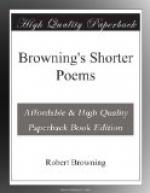The trait in Browning which appeals to the largest number of readers is his strenuous optimism. He will admit no evil or sorrow too great to be borne, too irrational to have some ultimate purpose of beneficence. “There shall never be one lost good,” says Abt Vogler. The suicides in the morgue only serve to call forth his declaration:—
“My own hope is, a sun will
pierce
The thickest cloud earth ever stretched;
* * * * *
That what began best can’t
end worst,
Nor what God blessed once, prove accurst.”
He has no fear of death; he will face it gladly, in confidence of the life beyond. His Grammarian is content to assume an order of things which will justify in the next life his ceaseless toil in this, merely to learn how to live. Rabbi Ben Ezra’s old age is serene in the hope of the continuity of life and the eternal development of character; he finds life good, and the plan of things perfect. In brief, Browning accepts life as it is, and believes it good, piecing out his conception of the goodness of life by drawing without limit upon his hopes of the other world. With the exception of a few poems like Andrea del Sarto, this is the unbroken tone of his poetry. Calvinism, asceticism, pessimism in any form, he rejects. He sustains his position not by argument, but by hope and assertion. It is a matter of temperament: he is optimistic because he was born so. Different from the serene optimism of Shakespeare’s later life, in The Tempest and The Winter’s Tale, in that it is not, like Shakespeare’s, born of long and deep suffering from the contemplation of the tragedies of human life, it bears, in that degree, less of solace and conviction.
To Browning’s temperament, also, may be ascribed another prominent trait in his work. He steadily asserts the right of the individual to live out his own life, to be himself in fulfilling his desires and aspirations. The Statue and the Bust is the famous exposition of this doctrine. It is a teaching that neither the poet’s optimism nor his acumen has justified in the minds of men. It is a return to the unbridled freedom of nature advocated by Whitman and Rousseau; an extreme assertion of the value of the individual man, and of unregulated democracy; an outgrowth, it may be, of the robustness and originality of Browning’s nature, and interesting—not as a clew to his life, which conformed to that of organized society—but as a clew to his independence of classical and conventional forms in the exercise of his art.




